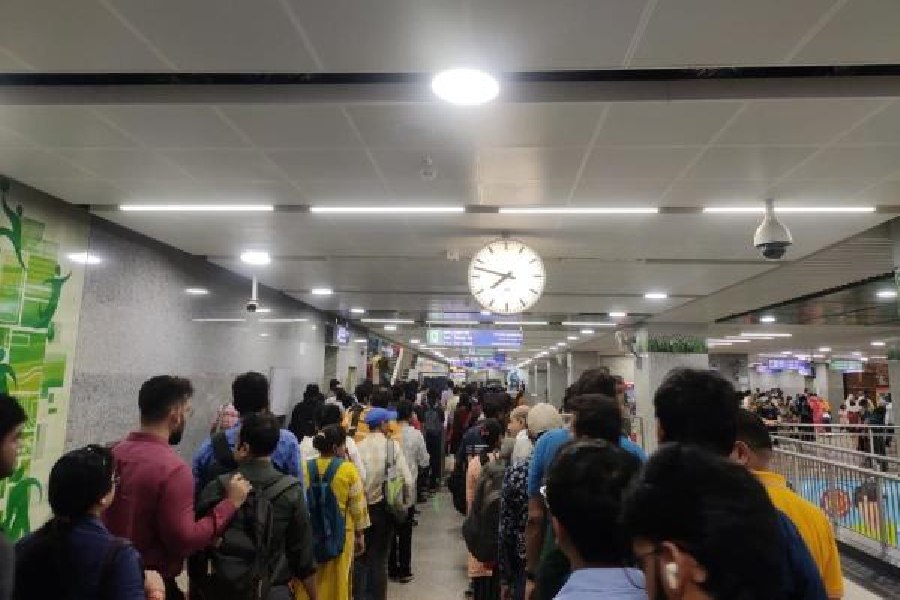East-West Metro passengers alleged that they have to suffer a lengthy wait to get in and out of platforms at the stations on the newly inaugurated Howrah Maidan-Esplanade stretch during rush hours.
Passengers alleged that at some stations, there are not enough entry and exit gates, which are leading to queues. To add to the inconvenience, the paper tickets with QR codes often do not function.
Only a handful of Railway Protection Force (RPF) personnel are deployed at the stations and there are not enough outsourced private security guards to manage the rush-hour crowd or guide passengers, they complained.
A daily commuter between Esplanade and Howrah Maidan said: “I have to usually wait for nearly 10 minutes at Howrah Maidan station every evening to get out of the platform. At times, the paper tickets with QR codes do not function. The security personnel then have to get those passengers exit manually,” said the passenger.
“This is also adding to the delay.”
An official at the Kolkata Metro Rail Corporation, the implementing agency of East-West Metro (Green Line), said there were stray issues with QR coded tickets.
“We have not received any major complaint about the QR coded tickets,” said the official.
This newspaper reported on Saturday about the snaking queues and long waiting
periods at the ticket counters.
A passenger shared a picture with this newspaper last week. It shows two snaking queues at the exit gates of Howrah Maidan Metro station in the evening.
“At least 100 people were waiting to get out. It took me more than 10 minutes to reach the stairs leading to the exit. There should have been more gates at the station,” he said.
Howrah Maidan Metro station has two gates, both on GT Road.
Similar scenes have been playing out at Howrah and Mahakaran stations as well, passengers said. Both the stations have four gates each.
“Howrah Maidan station is designed in a way that it can handle a peak-hour rush of 4,600 passengers. All the new stations have been designed in keeping with the findings of a RITES survey. Some crowding is inevitable during peak hours. There is nothing unusual,” said a Metro official.
Several passengers also complained about the lack of enough RPF personnel to
help them at the four new stations — Howrah Maidan, Howrah, Mahakaran and Esplanade.
Commercial services on the truncated section of East-West Metro began on
March 15.
The stations in the new section are sprawling and a non-regular passenger often needs help with directions of the platforms and the gates. But the lack of enough RPF personnel is compounding the problem.
A woman who boarded a train in the north-south corridor (Blue Line) at Tollygunge got off at Esplanade. She took the subway leading to the Esplanade station of the east-west corridor.
“But at the new Esplanade station, I was confused about which way the platform was. I finally managed by asking a couple of passengers. I could not see any RPF jawan, who can easily be spotted at the stations of the old (north-south) Metro,” said the woman, who was headed to Howrah.
For security, crowd control and assistance, Metro is banking on outsourced private agencies. The number of RPF personnel is limited.
Security guards have been deployed at ticket counters, smart gates, concourses and platforms of the new Metro stations.
The carrier has hired around 100 guards from multiple agencies for deployment across the four stations, sources said.
“There are around 10 guards at each station in one shift. For every 10 guards, there are two to three RPF personnel at every station,” said one of them.
“The role of the RPF personnel is to supervise the guards,” the official said.
Metro spokesperson Kausik Mitra said: “We will increase the RPF deployment at the new stations in a phased manner. We are also continuously improving the station signage to assist passengers.”
